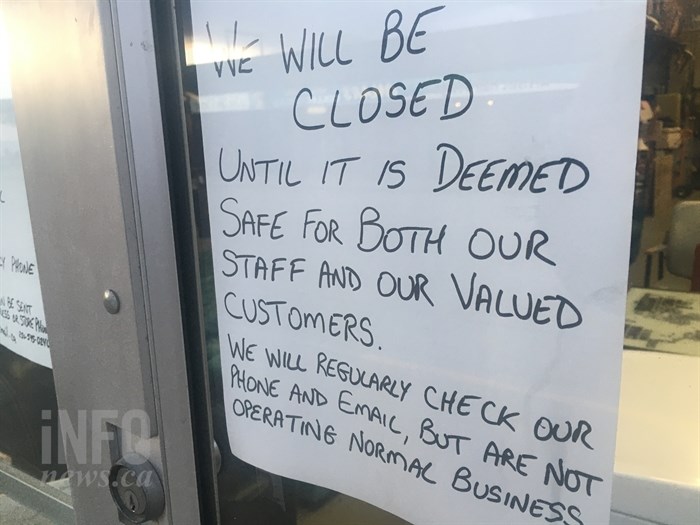
A sign on a downtown Vernon business.
(BEN BULMER / iNFOnews.ca)
April 01, 2020 - 7:00 AM
For the first time since the novel coronavirus swept through the country, millions of Canadians are waking up this morning faced with paying the rent or mortgage at a time when almost half of Canadians say they are only $200 away from not meeting their monthly bills.
According to an Ipsos survey commissioned by insolvency firm MNP, 34 per cent of Canadians are worried about someone in their household losing their job, and 30 per cent are not confident they could cope financially with the loss of employment or a change in wages.
The figures paint a sober picture on what was already a grave situation, with a quarter of Canadians already saying they are unable to meet all their debt obligations.
"Over the next few months we’ll likely see an unfolding of two crises: the global pandemic and the bursting of the Canadian consumer debt bubble,” MNP President Grant Bazian said in a media statement.
With so many Canadians carrying so much debt, financial obligations disrupted by COVID-19 is going to affect a wide variety of people.
"It's not just people making minimum wage," Credit Counselling Society financial educator Mark Kalinowski told iNFOnews.ca. "Most people in B.C. earn a decent income, they have a good household income but they live right up to the hilt, they spend all the money they have."
Kalinowski said the rise in the cost of housing, wages not increasing along with the cost of living people, combined with low interest rates and a culture of debt, has led to people living beyond what they can afford.
The Canadian government has rolled out a multitude of programs to help those whose finances have been affected by the coronavirus.
The debt load Canadians carry has built up over years and although the 2008-2009 financial crash did change things for some, the majority of people carried on spending and not saving.
There are hopes that some good will come out of the coronavirus situation when it's over.
"We really have to focus on what we need to begin with," Kalinowski said. "Maybe we'll live less extravagant lives but feel more secure in them.... people will re-establish some priorities."
Thompson Rivers University Economics professor Dr. Ehsan Latif said long-term solutions are needed to fix Canada's current debt crisis.
"All developed countries have this similar problem," Latif said. "(People's) mindset is part of the problem."
Latif hopes society will learn from the current crisis and new ways of doing things can be introduced. Latif points to increases in the living wage, building subsidized housing, and cutting taxes for the middle-class, all as ways of creating a brighter future. He also hopes people will start saving.
In the meantime, Kalinowski says there's a lot of anxiety and has advice for those struggling.
"If people are feeling stressed they should seek help... it's ok to call credit counselling," he said. "Don't go it alone, don't be afraid, we're all in this together and it's just going to take some time to figure out."
For a comprehensive list of financial help available from the government and to contact the Credit Counselling Society go here.
To contact a reporter for this story, email Ben Bulmer or call (250) 309-5230 or email the editor. You can also submit photos, videos or news tips to the newsroom and be entered to win a monthly prize draw.
We welcome your comments and opinions on our stories but play nice. We won't censor or delete comments unless they contain off-topic statements or links, unnecessary vulgarity, false facts, spam or obviously fake profiles. If you have any concerns about what you see in comments, email the editor in the link above.
News from © iNFOnews, 2020